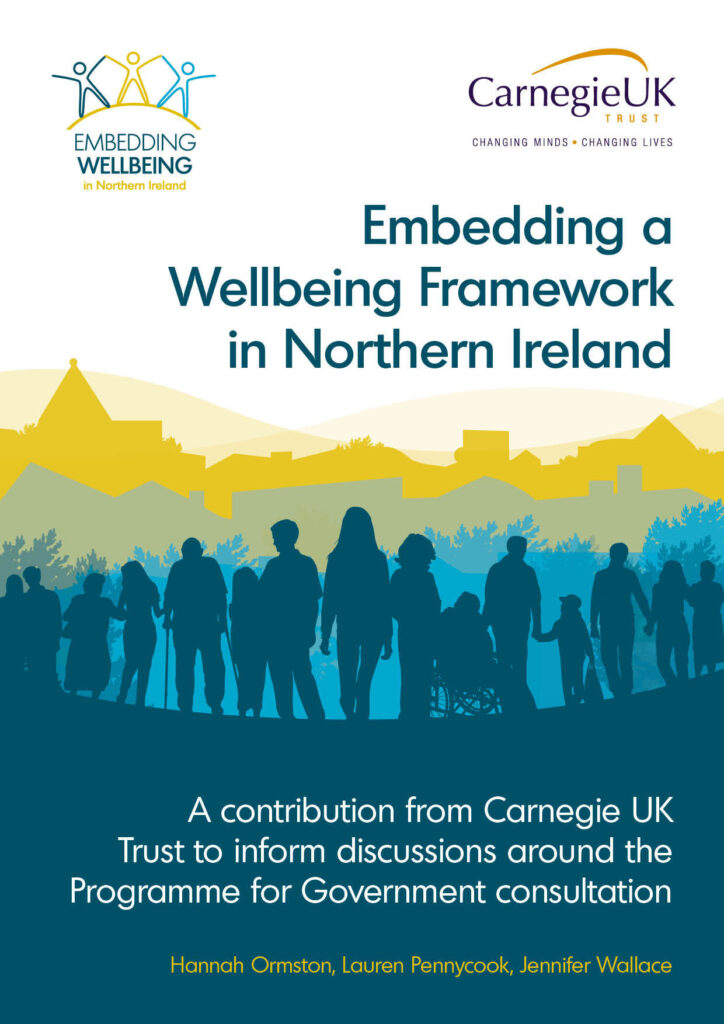From Hannah Ormston and Jennifer Wallace of the Carnegie UK Trust.
From the quality of our relationships to our health, to the places we call home and our income – the contribution of each to our wellbeing cannot be understood in isolation. And if we didn’t know it before, the COVID-19 pandemic has shown us that we live our lives in the round, not as single issues or consumers of individual services.
Writing last summer in Northern Slant, the Carnegie UK Trust reflected on the ways the COVID-19 pandemic had disrupted traditional ways of working and how we deliver public services.
We set out a number of proposals to inform the medium-term recovery, which built on our ongoing work with three Community Planning Partnerships in Northern Ireland and previous work in 2015 supporting the then Executive to place wellbeing at the heart of the draft Programme for Government 2016-2021.
And just as the pandemic has evolved over the past nine months, so too has our understanding of its role in the recovery and the next steps required in Northern Ireland’s journey towards a wellbeing outcomes approach. It is this journey, one which has so far been intermittent, that has informed our discussion paper in response to the Executive’s draft Programme for Government Outcomes Framework.
The draft Programme for Government is orientated to outcomes and is a helpful and welcome staging post. However, in response to PfG consultation, we call on the NI Executive to go further and put the wellbeing outcomes approach on a statutory footing to ensure its permanence.
What is meant by wellbeing?
We define societal wellbeing as comprising Social, Economic, Environmental, and Democratic (SEED) outcomes. To us, societal wellbeing means everyone having what they need to live well now and in the future. More than health and wealth, it includes having friends and loved ones, the ability to contribute meaningfully to society, and the ability to set our own direction and make choices about our own lives. A wellbeing approach to government balances SEED outcomes and provides a mechanism for understanding interlinkages and making trade-offs between the different domains of wellbeing.
What are we proposing?

Our discussion paper outlines six ways of working that we believe will enable the NI Executive to achieve its goal of improving wellbeing for all.
- Fully commit to an outcomes-based approach – placing the wellbeing outcomes approach on a statutory footing with Ministers demonstrating collective leadership in ensuring the delivery of the wellbeing outcomes approach.
- Collaborating for outcomes – legislating for a Duty to Co-operate requiring agencies and tiers of government to work together on Community Planning to maximise the impact and effectiveness of new and existing legislation. This should be extended to the delivery of all public services.
- Budgeting for outcomes – aligning budgets with outcomes in the Programme for Government.
- Strengthening local wellbeing approaches – providing ring-fenced multi-year funding for Community Planning, to ensure the Partnerships’ ability to deliver on improving local wellbeing outcomes both over the course of the current Plans and into 2030-2035, and to support the delivery of societal wellbeing outcomes in the Programme for Government.
- Data for outcomes – Northern Ireland Executive should provide dedicated resources to Community Planning Partnerships to facilitate greater use of data and evidence to inform decision making at a local and national level. There is also a need to ensure that the proposed indicator website is co-designed with citizens and communities, based on engagement with those groups as well as public service providers and experts, and able to provide data at hyperlocal, local and regional level.
- Citizen engagement and open government – hosting a full public conversation on societal wellbeing in a post-COVID-19 society.
From legislation to linking budgets to outcomes; to collective leadership and the use of more deliberative methods of citizen engagement. Our experience shows us that we need an approach to making decisions at all levels of government that reflects the connectedness and interdependency of policies that affect our lives, to collectively shift the dial in favour of wellbeing.
There is an appetite for change amongst the public while the current context of the COVID-19 pandemic provides the ideal opportunity for the Executive to create and deliver a holistic approach which is informed by the learning from the collaborative response to the crisis between central government, local government and other partners.
Read the Carnegie UK Trust’s discussion paper here.
More on Northern Slant:
- Putting wellbeing at the centre of our ‘build back better’ recovery by Lauren Pennycook, a Senior Policy and Development Officer at the Carnegie UK Trust.
